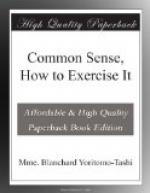All those who are inclined to act by instinct should follow this example, not by dressing up in a ridiculous robe half green and half yellow, but by placing obstacles in the way of the accomplishment of impulsive acts, which the dictates of common sense would not sanction.
“For those whose mind possess a certain delicacy,” again says the old master, “these obstacles will be of a purely moral order, but for those who voluntarily allow themselves to be dominated by a diseased desire for action, obstacles should adopt a tangible form; the difficulty in conquering anything always makes impulsive people reflect a little.
“Under the immediate impression of the perception of an act they are ready for a struggle to the death; but this ardor is quickly extinguished, and inertia, in its turn, having become an impulse, makes them throw far away from them the object which determined the effort.
“In proportion as they encounter obstacles, which they have taken the precaution to raise, the encroachment of the impression will make itself less felt.
“The mere fact of having foreseen will become a matter for reflection for them.
“The feeling of the responsibilities will be roused in them, and they will understand how difficult it is to escape the consequences of impulsive acts.”
Would one not say that these lines had been written yesterday?
More than ever our age of unrest makes us the prey of impulses, and to the majority of our contemporaries, the robe, half green and half yellow (by recalling to them the worship of common sense), will become a fetish, more precious than all the amulets with which superstition loves to adorn logic, or to incorporate fantastic outline in the classic setting of beautiful jewels.
LESSON V
THE DANGERS OF SENTIMENTALITY
The Shogun says: “There are sentimentalities of many kinds, some present less dangers than others, but from every point of view they are prejudicial to the acquisition and exercise of common sense. To cultivate sentiment over which the Will has no control is always to be regretted.
“Sentimentality is multiform.
“It presents itself, at times, under the aspect of an obscure appeal to sensuality and brings with it a passing desire of the heart and of the senses, which produces an artificial appreciation of the emotion felt.
“In this first case sentimentality is an unconscious manifestation of egotism, because, outside of that which provokes this outward manifestation, everything is alienated and becomes indistinct.
“The incidents of existence lose their true proportion, since everything becomes relative to the object because of our preoccupation.
“The impulse reigns supreme there when sentimentality establishes itself, and the desire of judgment, if it makes itself apparent, is quickly shunned, to the profit of illusory reasons, in which pure reason does not intervene.




